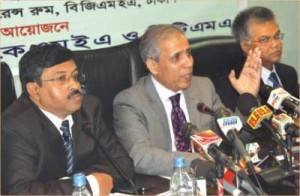


February 03, 2012
Garment leaders call for political calm
Garment and textile entrepreneurs yesterday urged political leaders to shun activities that may put the economy in trouble.
A vested quarter is trying to push the country's main foreign currency earning sector - the readymade garment (RMG) sector - and its backward linkage industry - the textile sector - into a crisis, the businessmen alleged.
But they did not name any specific group or people “trying to create anarchy”.
They spoke at a joint press conference on "the current situation of garment and textile sectors" at Bangladesh Garment Manufacturers and Exporters Association (BGMEA) in Dhaka.
Leaders from two other associated bodies -- Bangladesh Knitwear Manufacturers and Exporters Association (BKMEA) and Bangladesh Textile Mills Association (BTMA) -- also attended the programme.
“Those who want to destabilise the democracy are considered as conspirators in the country,” said Shafiul Islam Mohiuddin, president of BGMEA.
Mohiuddin also said economy and politics are inter-related. If the politics passes through a troubled time, the economy will suffer, he added.
“So, we hope the political leaders will not launch any such activity in the country that will harm the economy.”
The business leader also said the two sectors are passing through an uncertain period for slowdown in the global economy. Some recent government policies have also affected the sectors.
The government's excessive borrowing from the banking system has created the liquidity crisis, which is also affecting the RMG sector seriously, Mohiuddin said.
The garment sector is losing its global competitiveness due to the spiralling production cost imposed by high bank interest rates, he said.
“We urge the government to keep the lending rates at a tolerable level considering the long-term global competitiveness of the sector.”
The BGMEA chief also demanded reinstatement of the premium insurance rates for garment exporters that the country's insurers recently scrapped and introduced a standard rate as per the recommendations of the Insurance Development and Regulatory Authorities.
“Introduction of such standard rate without consulting with exporters is not right.”
Similarly, the authorities of Chittagong port did not reduce the charges on garment export, although Prime Minister Sheikh Hasina assured to do so in her Batexpo speech in 2009, he said.
Mohiuddin urged the government to construct central effluent treatment plants (CETPs) in different industrial zones as entrepreneurs cannot set up such costly facilities individually.
Officials of the Department of Environment fine garment owners irrationally for not having ETPs at the factories or for partial operations of water and chemical treatment at their premises, he said.
Jahangir Alamin, president of BTMA, said poor supply of gas is hampering production in factories seriously.
“I need 10 PSI (per square inch), but I receive only 3 PSI during the peak of production. But owners have to pay the government at the rate of 10 PSI," he said.
He urged the government to introduce electronic gas metres at the factories for measuring gas pressures correctly.

Copyright © 2020, The Bangladesh Garment Manufacturers and Exporters Association.
Version-2.0, Design & Developed by Systech Digital Limited.
Version-2.0, Design & Developed by Systech Digital Limited.
